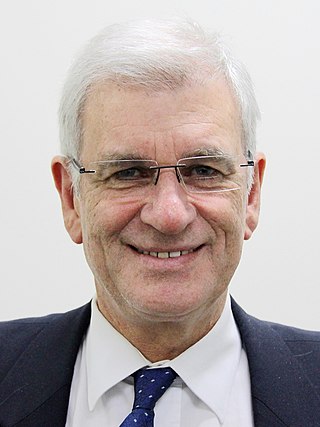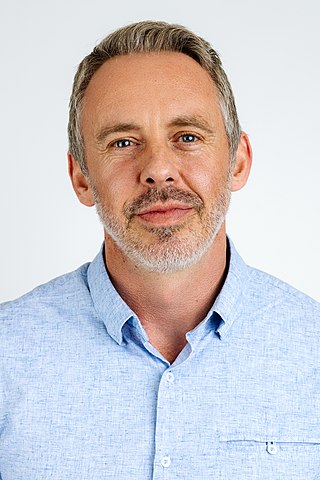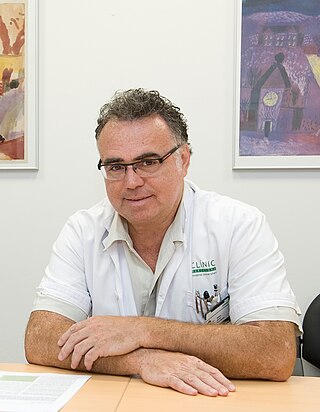Related Research Articles
Schizoaffective disorder is a mental disorder characterized by abnormal thought processes and an unstable mood. This diagnosis is made when the person has symptoms of both schizophrenia and a mood disorder: either bipolar disorder or depression. The main criterion for a diagnosis of schizoaffective disorder is the presence of psychotic symptoms for at least two weeks without any mood symptoms present. Schizoaffective disorder can often be misdiagnosed when the correct diagnosis may be psychotic depression, bipolar I disorder, schizophreniform disorder, or schizophrenia. It is imperative for providers to accurately diagnose patients, as treatment and prognosis differ greatly for most of these diagnoses.
Biological psychiatry or biopsychiatry is an approach to psychiatry that aims to understand mental disorder in terms of the biological function of the nervous system. It is interdisciplinary in its approach and draws on sciences such as neuroscience, psychopharmacology, biochemistry, genetics, epigenetics and physiology to investigate the biological bases of behavior and psychopathology. Biopsychiatry is the branch of medicine which deals with the study of the biological function of the nervous system in mental disorders.

The Maudsley Hospital is a British psychiatric hospital in south London. The Maudsley is the largest mental health training institution in the UK. It is part of South London and Maudsley NHS Foundation Trust, and works in partnership with the Institute of Psychiatry, King's College London. The hospital was one of the originating institutions in producing the Maudsley Prescribing Guidelines. It is part of the King's Health Partners academic health science centre and the National Institute for Health and Care Research (NIHR) Biomedical Research Centre for Mental Health.

Adolf Meyer was a Swiss-born psychiatrist who rose to prominence as the first psychiatrist-in-chief of the Johns Hopkins Hospital (1910-1941). He was president of the American Psychiatric Association in 1927–28 and was one of the most influential figures in psychiatry in the first half of the twentieth century. His focus on collecting detailed case histories on patients was one of the most prominent of his contributions. He oversaw the building and development of the Henry Phipps Psychiatric Clinic at Johns Hopkins Hospital, opened in April 1913, making sure it was suitable for scientific research, training and treatment. Meyer's work at the Phipps Clinic is possibly the most significant aspect of his career.

Lawrence Coleman Kolb was an American psychiatrist who was the New York State Commissioner of Mental Hygiene from 1975 to 1978.

Ewald Hecker was a German psychiatrist who was an important figure in the early days of modern psychiatry. He is known for research done with his mentor, psychiatrist Karl Ludwig Kahlbaum (1828-1899).

Hagop Souren Akiskal was a Lebanese-born American psychiatrist and professor, of Armenian descent. He is best known for his research on temperament and bipolar disorder, revolutionizing the field of clinical psychiatry.
Slavko Ziherl, MD, PhD was a Slovenian specialist in psychiatry.
Peter C. Whybrow is an English psychiatrist and award-winning author whose primary research focus has been on understanding the metabolic role of thyroid hormones in the adult brain and how to apply this knowledge to the treatment of mood disorder, especially bipolar disorder. He is Judson Braun Distinguished Professor in the Department of Psychiatry and Biobehavioral Sciences of the David Geffen School of Medicine at UCLA.

Philip Manley Boyce is an Australian psychiatrist. He is a professor of psychiatry and head of discipline of psychiatry at the University of Sydney, and head of Perinatal Psychiatry Clinical Research Unit at Westmead Hospital. He has published more than 170 articles, and frequently contributes to psychiatric textbooks. He currently serves as associate editor of Australian and New Zealand Journal of Psychiatry. He has a long clinical and research interest in anxiety disorders, mood disorders, psychosomatic disorders, and perinatal psychiatry. He has also taken leadership roles in the profession as president of the RANZCP and the international Marcé society, in the development of clinical practice guidelines, and in the development of a competency-based training program for the college.
William T. Carpenter, M.D. is a psychiatrist, a pioneer in the fields of psychiatry and pharmacology who served as an expert witness in the John W. Hinckley trial for the attempted assassination of U.S. President Ronald Reagan. His primary professional interest is in severe mental illness, especially schizophrenia, to the prevention and treatment of which he has made significant contributions in psychopathology, assessment methodology, testing of new treatments, and research ethics.

Julie Holland is an American psychopharmacologist, psychiatrist, and author. She is the author of five books, including Weekends at Bellevue: Nine Years on the Night Shift at the Psych ER, a memoir documenting her experience as the weekend head of the psychiatric emergency room at Bellevue Hospital in New York City An advocate for the appropriate use of consciousness expanding substances as part of mental health treatment, she is a medical monitor for MAPS studies, which involve, in part, developing psychedelics into prescription medication.
Ronald Robert Fieve was an American psychiatrist known for his work on the use of lithium in treatment of mood disorders. He has authored four popular science books, "Moodswing", "Bipolar II", "Prozac" and "Bipolar Breakthrough".

Reid Robison is an American board-certified psychiatrist known primarily for his work with psychedelic medicines. As an early adopter and researcher of the use of ketamine in psychiatry, Robison has made significant contributions to ketamine-assisted psychotherapy (KAP) and other treatment modalities using ketamine for mental health conditions. He previously served as coordinating investigator for a study on MDMA-assisted psychotherapy for eating disorders, sponsored by the Multidisciplinary Association for Psychedelic Studies (MAPS), and he continues to lead research and psychiatric clinical trials involving psychedelics. To date, Robison has guided thousands of ketamine-assisted therapy sessions and Spravato dosing sessions. He currently serves as Medical Director of Center for Change, an eating disorder treatment center in Utah, and Chief Clinical Officer of Numinus, a Vancouver-based mental health company focused on psychedelic research and treatments. Robison is an adjunct professor at both the University of Utah and Brigham Young University.

Eduard Vieta Pascual is a Spanish psychiatrist and a leading scientific authority on the neurobiology and treatment of bipolar disorder.
Joseph Zohar is the director of Psychiatry and the Anxiety and Obsessive Compulsive Clinic at the Sheba Medical Center in Tel HaShomer and professor of psychiatry at Tel Aviv University, Israel. He is the founder of the World Council on Anxiety as well as the Israeli Consortium on PTSD. He currently leads the chief installation of the Israeli Defense Force for the treatment of PTSD. He is a member of the executive committee of the European College of Neuropsychopharmacology, of which he is a former president, and chairman of the Expert Platform on Mental Health.
Augustus John Rush is an internationally renowned psychiatrist. He is a professor emeritus in Duke-NUS Medical School at the National University of Singapore (NUS), and adjunct professor of psychiatry and behavioral sciences at Duke University School of Medicine. He has authored and edited more than 10 books, and over 600 scientific journal articles that are largely focused on the diagnosis and treatment of depressive and bipolar disorders.

Lori Altshuler was a professor at the University of California, Los Angeles (UCLA) Department of Psychiatry and Biobehavioral Sciences and held the Julia S. Gouw Endowed Chair for Mood Disorders. Altshuler was the Director of the UCLA Mood Disorders Research Program and the UCLA Women's Life Center, each being part of the Neuropsychiatric Hospital at UCLA.
The Spring Grove Experiment is a series of lysergic acid diethylamide (LSD) studies performed from 1963 to 1976 on patients with psychotic illnesses at the Spring Grove Clinic in Catonsville, Maryland. These patients were sponsored by a federal agency called the National Institute of Mental Health to be part of the first study conducted on the effects of psychedelic drugs on people with schizophrenia. Then, the Spring Grove Experiments were adapted to study the effect of LSD and psychotherapy on patients including alcoholics, heroin addicts, neurotics, and terminally-ill cancer patients. The research done was largely conducted by the members of the Research Unit of Spring Grove State Hospital. Significant contributors to the experiments included Walter Pahnke, Albert Kurland, Sanford Unger, Richard Yensen, Stanislav Grof, William Richards, Francesco Di Leo and Oliver Lee McCabe. Later, Spring Grove was rebuilt into the Maryland Psychiatric Research Center, where studies continued to be performed for the advancement of psychiatric research. This study on LSD is the largest study on psychedelic drugs to date.
J. Paul Fedoroff is a Canadian forensic psychiatrist, sexologist, and researcher who specializes in treating individuals with paraphilic disorders and/or individuals with developmental delay. He is now the first director of the Sexual Behaviours Clinic (SBC) at the Institute of Mental Health Research at the Royal Ottawa Mental Health Centre located in Ottawa, Ontario. He is a full professor of forensic psychiatry, criminology, and law at the University of Ottawa.
References
Saunders, N. (1994) E for Ecstasy by Nicholas Saunders Appendix 1: Reference Section Retrieved 10/5/2008.